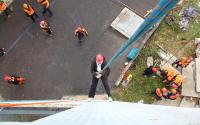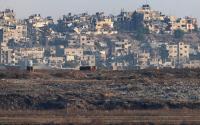12 June, 2002
Ha'aretz DailyThe far-reaching significance of Israel's siege policy and the institutionalization of the pass system for travel through the West Bank is in direct contradiction to the minimal - if any - interest shown in Israel about the phenomenon.
The siege policy is perceived as a legitimate means to prevent attacks on Israelis inside Israel, and on soldiers and settlers in the West Bank and the Gaza Strip. Since September 2000, the sieges on all the Palestinian cities and villages has been increasingly tightened and at the same time, motivation has risen among young Palestinians to kill themselves in suicide attacks on Israelis. The Palestinians understand that urge as a reaction to the concrete suffocation that the siege creates, as well as a metaphor for their utter lack of hope for a chance for free lives. On the Israeli side, the majority is convinced that there is no connection between the two and that if not for the sieges, the number of attacks would greatly increase.
So, there's no point in wasting words on Israelis on the immorality of effectively locking up 3 million people in enclaves, between barbed wire and frightening army checkpoints. What the Palestinians perceive as ruthless collective punishment, the Israelis perceive as a necessary evil: It may cause "discomfort" to the innocent, but it is the system that puts limits on the use of lethal means in the hands of the army.
For the same reason, explanations by the coordinator of government activity in the territories, that the pass system in the West Bank is meant to ease the situation for the Palestinians, sound logical. And the Israel Defense Forces has been doing what it can in the past few weeks to make it easier for the government coordinator to make his position clear. The closure of every city, town and village is more and more hermetic, and more and more violent. That's why when people are being sent to the Civil Administration offices to ask for permission to do the most basic things in daily life - go to work, to school, to the doctor, to friends, to family - it appears humane.
Nonetheless, here's a scenario built into the siege policy. Most people considered the pass system as a "temporary measure." But, since it now covers all Palestinian movement inside the territories, it's impossible to distinguish between it and the settlements' existence. The internal sieges are meant to protect their security and safety and the safety of the soldiers protecting the settlements. As opposed to the illusions of those who support peace, Israel does not regard the settlements as "temporary" or as a "bargaining card." The statistics about the growth of the settlements in the "peace decade" of Madrid and Oslo are proof of this.
Bureaucratic institutions have a tendency to perpetuate themselves and their methods. The IDF and the Civil Administration will do all they can in the coming years to convince whoever they must that it's still not time to give up the travel pass system, which means maximum supervision of all Palestinian movement. Their approach will influence the political negotiations in the coming years.
Just as the travel pass between Gaza and the West Bank became a permanent feature, the travel passes for movement inside the West Bank will become permanent. People will wait days and weeks for permission to go from one town to the next, and that permission won't be granted - whether because of a lack of manpower, or because of efforts to draft recruits as informants. Every commercial and industrial activity will require the good graces of an Israeli official who will apply his own personal translation to the rules handed down by the Shin Bet and the army, and those rules will change daily.
As the World Bank has warned, sieges and closures are in direct contradiction to every principle of development and advancement of the private sector. It will only take a few months for the division of the West Bank into disconnected enclaves to reduce most of the Palestinian population into welfare cases. The higher education system will totally collapse - of course, the security authorities in Israel always have regarded the students as a dangerous population that should not be allowed to travel. It will be impossible to rehabilitate industry because of the need for credit in other cities, the marketing costs (the back-to-back trucking system, which requires multiple transfers of goods from one truck to the next on the outskirts of each town, forbidding direct transport of merchandise from town to town), the difficult in finding labor and the lack of land reserves (most of the open land is outside the areas under siege).
Already the sieges are causing severe sanitation and health problems. There are signs of malnutrition, it is difficult to move refuse to areas outside the boundaries of the siege, and water is in short supply, particularly in those villages that depend on regular delivery of water containers. This is in addition to delays in medical supplies and vaccinations for infants. As unemployment mounts, such problems and many others will only get worse.
The long-term imprisonment in the enclaves is paralyzing the senses, the desire and the ability to initiate, blocking both individual and collective creativity. But it presumably is pushing more desperate young people to dream about their own destructive reaction to the Israeli policy, no matter how difficult it will be to accomplish.
This is only an imaginary scenario for those who aren't ready to look at what's going on a kilometer from their homes and those who aren't ready to think about "security" in terms that are far from long-term.






